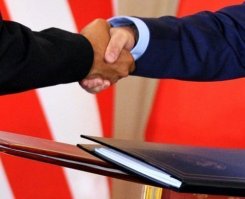Russia Cuts Nuclear Arsenal Below New START Levels
June 2, 2011
Featured Image
Today's top nuclear policy stories, with excerpts in bullet form.
Stories we're following today: Thursday, June 2, 2011.
Russia Cuts Nuclear Arsenal Faster Than Required - Reuters [link]
- Russia has 1,537 deployed strategic nuclear warheads, just under the 1,550 ceiling it is obliged to reach by 2018 under the New START nuclear arms reduction pact, while the United States has 1,800, according to a State Department fact sheet.
- [The US and Russia] committed to deploy no more than 700 intercontinental ballistic missiles, submarine ballistic missiles or heavy bombers. As of Feb. 5, the United States had 882 of these and Russia 521.
- "If Russia can accelerate its reductions, so can the United States," he added. "There is no need for the Pentagon to wait until 2018 to get to New START levels. As a confidence-building measure, the United States should speed up its reductions." [said Tom COllina of the Arms Control Association].
New START Aggregate Numbers Released: First Round Slim Picking - By Hans Kristensen in FAS Strategic Security Blog [link]
- Compared with the extensive aggregate numbers that were released during the previous START treaty, the new Fact Sheet is slim picking: just six numbers.
- Each of the two parties to New START can decide under the treaty to release additional information to the public about their own nuclear postures…I understand from the U.S. government that it is planning to do so later this year, and it is important that Russia considers doing so as well.
China Undercuts Sanctions on Iran - By Barbara Slavin in Politico [link]
- An investigation by the Atlantic Council’s Iran Task Force released Thursday concludes that the sanctions against Iran will not succeed as long as the price of oil remains high and China continues its extensive involvement in the Iranian economy, in particular its oil and gas industry.
- China has not followed the United States, Europe, Japan and Australia in imposing further measures that would have a real impact on Iranian decision makers.
- If sanctions are to succeed, the U.S. must also persuade China to use its growing economic leverage over Iran to encourage it to accept a diplomatic solution. It is in China’s best interest as a rising great power to show that it has the ability to broker such deals
The Ayatollah Will Overwhelm Ahmadinejad - Mehdi Khalaji in CNN World [link]
- Mahmoud Ahmadinejad has now made the mistake that all Iranian presidents make: he has challenged the authority of the country's Supreme Leader, Ayatollah Ali Khamenei. He is doomed to fail.
- Khamenei will likely create a new faction to compete with traditional conservatives after Ahmadinejad's decline…Only those with a strong background in intelligence or the Revolutionary Guards, and a low profile in domestic politics, need apply.
- The concentration of power in the Supreme Leader's hands poses risks for the Islamic Republic. When Khamenei dies, there is no strong and obvious successor. And, since he has systematically weakened Iran's political institutions so that the Islamic Republic itself has come to be identified with his person, his absence will create a vacuum.
The U.S.-Russia Missile Defense Impasse - Council on Foreign Relations [link]
- Says CFR Russia expert Stephen Sestanovich. Sestanovich says there were hints the Russians might be willing to make some compromises on missile defense, but he notes that they are wary of anything that sounds like the Reagan administration's Star Wars defense, which was intended to neutralize Russia's nuclear deterrence.
- The U.S. side says they got "a new signal" on missile defense cooperation, suggesting that the Russians are interested in finding a way to cooperate on missile defense so that this doesn't become an issue that breaks the "reset".
- The question now is…What kind of parallel and complementary systems could be devised so they produce more security rather than more anxiety about whether or not the Russians can be depended on?
Editorial Boards Who Should Have Read the Above CFR report
Red Button or Reset Button? - The Washington Times [link]
- The Obama administration is seeking Russian buy-in for a U.S.-European missile-defense system, but the price is too high.
- Russia opposes advancements in U.S. missile defense because it devalues Moscow’s offensive nuclear arsenal. Mr. Obama said America seeks to “find an approach and configuration that is consistent with the security needs of both countries, that maintains the strategic balance and deals with potential threats we both share,” but this is not possible.
- Moscow sees missile defense as a zero-sum game - in their view, the more the United States is able to defend itself, the weaker Russia becomes.



